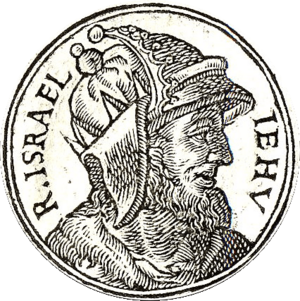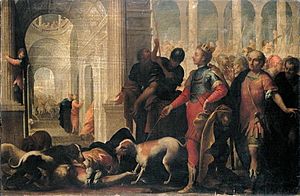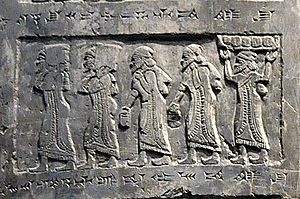Jehu facts for kids
Quick facts for kids Jehu |
|
|---|---|
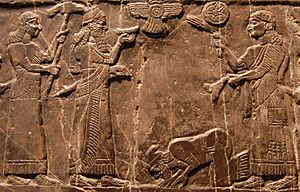
The tribute of "Jehu of the people of the land of Omri" (Akkadian: 𒅀𒌑𒀀 𒈥 𒄷𒌝𒊑𒄿) as depicted on the Black Obelisk of Shalmaneser III
|
|
| King of Northern Israel | |
| Reign | c. 841–814 BCE |
| Coronation | Ramoth-Gilead, Israel |
| Predecessor | Jehoram |
| Successor | Jehoahaz |
| Born | c. 882 BCE |
| Died | c. 814 BCE |
| Burial | Samaria, Kingdom of Israel |
| Issue | Jehoahaz |
| Father | Jehoshaphat |
Jehu (Hebrew: יֵהוּא, romanized: Yēhūʾ, meaning "Yahu is He") was the tenth king of the northern Kingdom of Israel. He is famous for ending the rule of the family of Ahab. Jehu was the son of Jehoshaphat. He ruled for about 28 years.
Historians like William F. Albright and E. R. Thiele suggest his reign was from around 842 to 814 BCE. Most of what we know about Jehu comes from the Bible, specifically the book of 2 Kings.
Contents
Becoming King of Israel
Jehu became king during a war. The previous king, Jehoram, was fighting against the Arameans. King Jehoram was hurt in battle and went to Jezreel to get better. His nephew, Ahaziah, who was king of Judah, came to visit him.
At this time, the prophet Elisha sent one of his students to Ramoth-Gilead. The student's secret mission was to find Jehu, who was a military leader. The student anointed Jehu as king in a private room. He told Jehu that he was chosen by God to bring justice against the family of King Ahab. After giving the message, the student quickly left.
Jehu's fellow commanders first thought the student was strange. But when Jehu told them what happened, they were excited. They blew their trumpets and declared Jehu their new king.
Taking Control of Jezreel
Jehu quickly planned his move against King Jehoram. He took a small group of men and secretly went to Jezreel. When King Jehoram tried to escape, Jehu shot an arrow that killed him. Jehu then had Jehoram's body thrown into Naboth's vineyard. This was to get revenge for Naboth, whom Jehoram's parents, King Ahab and Queen Jezebel, had wrongly killed.
King Ahaziah of Judah saw Jehoram die and tried to run away. Jehu wounded him, but Ahaziah managed to reach Megiddo before he died.
Next, Jehu entered the palace in Jezreel. Queen Jezebel looked down from a window. She spoke to Jehu in a mocking way. Jehu then ordered her servants to throw her out of the window. They obeyed, and Jezebel died instantly. Jehu rode his chariot over her body. Later, when he wanted to bury her properly, only her skull, hands, and feet were left. Dogs had eaten the rest of her body.
Ending Ahab's Family
After taking over Jezreel, Jehu sent a message to the leaders in Samaria. He told them to find and kill all of King Ahab's royal family members. The leaders did as they were told. The next day, they piled the seventy heads of the princes in two heaps outside the city gate, just as Jehu had ordered. This meant that Ahab's entire family was wiped out.
Soon after, Jehu met 42 relatives of King Ahaziah. These were not Ahaziah's direct brothers, but other family members. They were visiting the royal family. Jehu, however, killed all of them at a place called "the pit of Beth-eked."
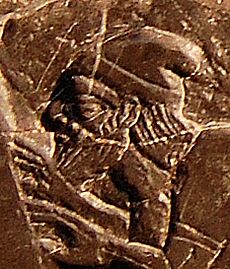
After these events, Jehu met a man named Jehonadab from the Rechabites. Jehu convinced Jehonadab that he was a true worshipper of Yahweh. Jehonadab joined Jehu, and they entered the capital city together. Once in control of Samaria, Jehu invited all the worshippers of Baal to a special ceremony. He then trapped them and had them killed. After that, he destroyed their idols and their temple. He even turned the temple into a public toilet.
Jehu's Rule
Not much is known about Jehu's reign after he took power. He was known for his violent takeover and for allowing the worship of golden calves in Dan and Bethel. Biblical writers saw this as a corrupted form of worshipping Yahweh.
During his rule, Jehu faced pressure from Hazael, the king of the Arameans. Hazael's armies defeated Jehu's forces in many parts of Israel. These areas included lands beyond the Jordan River, like Gilead, Gad, Reuben, and Manasseh.
It is thought that Jehu offered gifts to Shalmaneser III, the king of Assyria. This was likely to gain a powerful ally against the Arameans. The Bible says that God rewarded Jehu for carrying out divine justice against Ahab's family. Because of this, four generations of Jehu's family ruled Israel after him. These kings were Jehoahaz, Jehoash, Jeroboam II, and Zachariah. They ruled Israel for a total of 102 years.
Historical Discoveries
The Black Obelisk
Besides the Bible, Jehu is also mentioned in ancient Assyrian records. He appears on the Black Obelisk, a large stone monument. On the obelisk, Jehu is shown bowing down to Shalmaneser III and offering gifts. The Assyrian records call him "son of Omri". This likely means he was the ruler of the "House of Omri," which was another name for the Kingdom of Israel. This event, where Jehu paid tribute, is dated to 841 BCE. This image is the oldest known picture of an Israelite person.
The Obelisk suggests that Jehu stopped being allies with Phoenicia and Judah. Instead, he became a subject of Assyria.
The Tel Dan Stele
Another important discovery is the Tel Dan Stele. This stone monument from the 9th century BCE was found in the 1990s. The person who wrote on the stele claimed to have killed both Ahaziah of Judah and Jehoram of Israel. Some experts believe the writer was Hazael, the king of the Arameans. However, the Bible (2 Kings 9) clearly states that Jehu killed Ahaziah and Jehoram.
Dr. David Miano has suggested that Jehu himself might have been the one who wrote the Tel Dan Inscription. He presented this idea at a conference in 2021.
See also
 In Spanish: Jehú para niños
In Spanish: Jehú para niños
- List of biblical figures identified in extra-biblical sources
 | Toni Morrison |
 | Barack Obama |
 | Martin Luther King Jr. |
 | Ralph Bunche |


